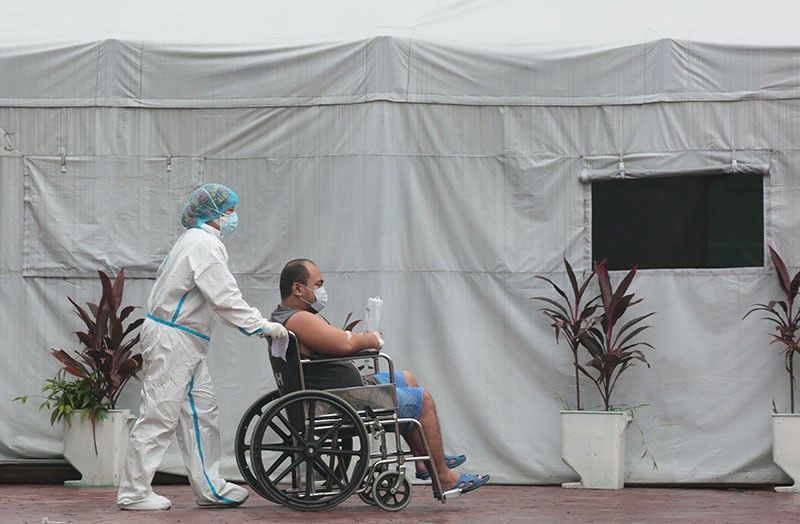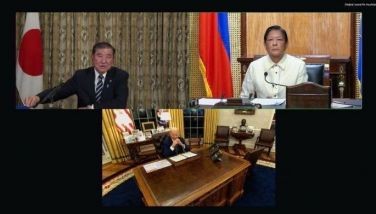Vaccine Solidarity Movement calls out 'anti-vaxxers', vows to address hesitancy

MANILA, Philippines — Anti-vaxxers — people who do not believe in vaccines and see them as health risks — who spread fake news are the prime source of vaccine hesitancy among Filipinos amid the coronavirus pandemic, a collective of healthcare and medical organizations said on Monday.
The root of the problem? Other medical professionals who entertain and even fuel anti-vaccine sentiment in the middle of a global pandemic.
This was the Vaccine Solidarity Movement's claim on Monday as groups from the public and public sector came together to proclaim a unified stand against practitioners in the field who are spreading anti-vaccination sentiments to the public.
Although there has been a decline in trust in vaccines, the campaign to inoculate Filipinos against COVID-19 has also been hampered by supply shortages and logistical issues.
Represented in the VSM are the Philippine Foundation for Vaccination, UP Manila College of Public Health, Philippine Medical Association, Philippine Nurses Association
Philippine Dental Association, Philippine Pharmacists Association, Integrated Midwives Association of the Philippines, CBRC Health Professionals Network, and marketing consulting agency GeiserMaclang.
In a joint statement sent to reporters, the movement denounced medical practitioners "who are not considered experts in the field of vaccination but continue to spread lies and misinformation to the public and engage with the media for interviews."
"You cannot call yourself a doctor or a medical expert if you’re an anti-vaxxer. There is no room in the medical field for people who question the validity and the scientifically proven positive effects of vaccines," they said.
"These types of malicious acts don’t only elicit fear, panic, and confusion in a county that’s already desperately lagging behind its vaccination rate; they also lead to the deaths of hundreds of unvaccinated people."
The movement, composed of globally-recognized experts, agreed at a press briefing Monday to pursue medical professionals actively campaigning to dissuade people from getting COVID-19 vaccines.
"We denounce all medical practitioners who deliberately cause panic, fear, and confusion among the public by making their anti-vaccination views known. We remain firm in our belief that doctors and other medical practitioners understand the important role that vaccines play in saving lives and preventing severe diseases, and so we deem it morally and intellectually wrong to both be a medical practitioner and an anti-vaxxer at the same time."
Vaccination against COVID-19 can help prevent transmission and infection but is not a guarantee that a vaccinated person will not get the coronavirus disease. Vaccines can, however, reduce the risk of contracting severe COVID-19 and reduce the need to get hospital treatment.
There have been cases of COVID-19 even among vaccinated health workers at the Philippine General Hospital but the cases have been mild.
The Department of Health has repeatedly stressed that vaccinated people should still practice safety measures like wearing face masks and face shields and physical distancing. People are also advised to stay at home to avoid the risk of exposure to the coronavirus.
Dengvaxia issue and vaccine hesitancy
Loss of trust in vaccines did not begin during the COVID-19 pandemic.
The politicization of Dengvaxia, an anti-dengue vaccine that was involved in controversy over its effectiveness and because government officials attributed deaths to it, contributed to a decline in vaccine trust as well as a measles outbreak in 2019.
Dengvaxia has since been discredited and pulled from shelves in the Philippines but questions on its effectiveness and on why it was approved for use also cast doubt on other vaccines that could protect individuals from life-threatening diseases.
A 2018 study of the London School of Hygiene and Tropical Medicine noted that the country’s “highly-politicized response” to the reported risks posed by Dengvaxia eroded overall public trust in immunization.
The research, which involved 1,500 participants, found that the respondents who expressed confidence in vaccines declined to 32% in 2018 from 93% in 2015.
The WHO named vaccine hesitancy as one of the top threats to global health in 2019, saying it "threatens to reverse progress made in tackling vaccine-preventable disease."
The vaccine for measles, mumps and rubella had been a particular focus of anti-vaccination or "anti-vaxxer" scare campaigns.
RELATED: How the Dengvaxia scare helped erode decades of public trust in vaccines
Misinformation adds to vaccine hesitancy, group says
In its statement, the collective also pointed to misinformation spread by mainstream media entities that entertain and amplify anti-vaccine sentiment by taking interviews with non-experts.
"There is a need to address the misinformation about vaccination circulating all over social media and news outlets. Because of this, we will do everything within our power and sphere of influence to educate the Philippine media industry to only tap experts in the vaccination field for interviews and press statements," the Vaccine Solidarity Movement said.
Consequently, the group called on journalists and media practitioners to avoid giving airtime and mileage to healthcare workers who speak beyond their area of expertise, particularly when it comes to vaccines.
"We will go as far as saying that this is directly tied to the ethics of responsible journalism which they should all be upholding especially at critical and challenging times like this," the group said, going as far as saying it would call for "the boycott of media entities that after being exposed to the science will continue to run non-scientific and unsubstantiated opinions for the sake of ratings."
"There are only limited fields of specializations that are allowed to speak about vaccination on national media and the DOH and WHO should endorse experts from this field before they grant any media interviews."
The group also slammed spreaders of anti-vaccine sentiment as being "anti-life and anti-poor."
"Vaccination is the only scientifically proven method to protect the poorest of the poorest and they are depriving them of this essential medical need. Consequently, being an anti-vaxxer at this time is tantamount to criminality," it said.
How bad is it?
Anti-vaccination sentiment in the Philippines, though a relatively new phenomenon, is well documented.
Results from a survey conducted by the Social Weather Stations from June 23 to June 26 suggest that about 45% of Filipinos are willing to get inoculated against the coronavirus. This was higher than the SWS survey from May, where only 3 out of 10 adult Filipinos were willing to get vaccinated.
Even the Philippine National Police went as far as urging the anti-vax community to desist from holding protest demonstrations against the government's national vaccination program.
Earlier, President Rodrigo Duterte, who has long touted vaccination and herd immunity as the only way out of the coronavirus crisis for the Philippines, threatened to arrest anyone who refuses to get vaccinated.
"If you don’t want to be vaccinated, I will have you arrested. The vaccine is from—I will have you injected on your butt," he said in Filipino at a public address in late June.
"But if you don’t want to, I will have you arrested. That is in pursuance of a policy of our crisis of this health issue."
The chief executive added that if people refuse to receive COVID-19 jabs, he will direct barangay captains to make a list of them.
"Choose: Get vaccinated or I will have you jailed? I am telling you, police detention cells are not clean, police are lazy to clean. Everything is there—every filth is there. You will stay there," he added.
To date, health authorities have recorded 1.84 million coronavirus infections in the country after tallying the third-highest daily increase so far with 16,044 new cases on Sunday.
FROM INTERAKSYON: ‘COVID-19 vaccines work’: PGH data shows lower COVID-19 infections among fully-vaccinated health workers
— with a report from Gaea Katreena Cabico
- Latest
- Trending



































